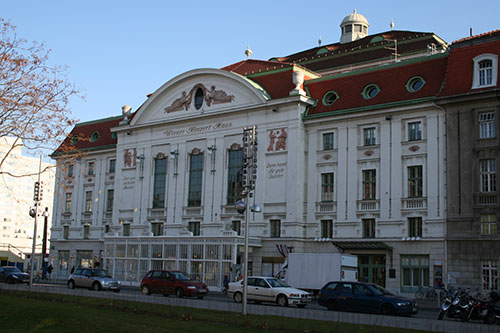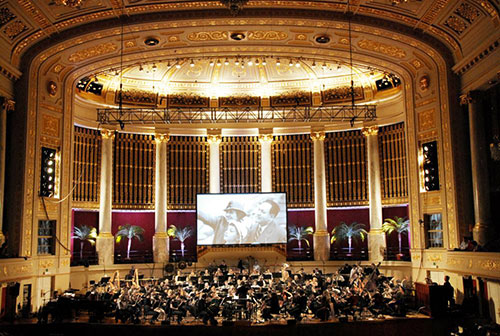Thursday, 29 November 2007 – Vienna, Wiener Konzerthaus.
Sponsored by the City of Vienna and the Austrian Cultural Ministry and produced by Best of Film Music and the Austria in Hollywood Society, tonight’s concert by John Mauceri and the Radio-Symphonieorchester Wien brought a Film Music Gala to the people of Vienna. But this was no mere film music concert. Not only was it held on the precise 50th anniversary of the death of Erich Wolfgang Korngold, and presented to honor Korngold as well, the concert also represented the first-ever presentation of film music in a traditional Viennese concert venue.

Though focusing primarily on Erich Wolfgang Korngold and his influence on Hollywood film composing and scoring, the program’s structure very cleverly wove together several subsidiary themes and stories. One theme was the bringing together – in a most unique manner – of two composers of different views, while simultaneously exploring the legacy that Korngold inspired – a legacy that is still heard in the film music composed today.
Arnold Schoenberg and Erich Wolfgang Korngold maintained a cordial, but distanced relationship for most of their lives, primarily due to the animosity Erich’s father, the renowned music critic Dr. Julius Korngold, held against the “new music” of the 20th century. Yet both composers suffered at the hands of the political atmosphere of the 1930s and early 40s. Both composers emigrated to the US, both lived in Hollywood, and following the death of Julius Korngold, both actually became good friends in exile. Tonight’s concert began and ended with brief homages to Schoenberg, though the focus was honoring Korngold – a posthumous reconciliation of these two geniuses. (To further the connection, the Schoenberg family was also in attendance at many of the Korngold events, along with, of course, Korngold’s own descendants.)
Schoenberg’s Fanfare for a Bowl Concert, written in 1945 for performance at the Hollywood Bowl, led off the evening. This was followed by the film music of Korngold, represented by the main title from Kings Row (1942), and concert suites of themes from Between Two Worlds (1944) and The Sea Hawk (1940). Completing the first half of the concert was a world premiere suite from The Adventures of Robin Hood (1938), arranged by John Mauceri himself. Of the new Robin Hood suite, the usual four-movement suite adapted by the composer was left behind in a massive, two-large-part collection of the music, representing every major cue (and probably most, if not all, minor ones as well) from the movie, in their proper sequence.
The second half of the program contained a selection of themes by contemporary composers John Williams, Jerry Goldsmith, and Bruce Broughton – examples of music that clearly reflect the late-romantic style of Korngold and his contemporaries that was adopted as the Hollywood sound in the 1930s. Indeed, the trends begun by Korngold with his groundbreaking scores to A Midsummer Night’s Dream (1934) and Captain Blood (1935) were clearly in evidence throughout the second half.
The Radio Symphony Orchestra – enhanced slightly by the presence of four young string players from Mauceri’s North Carolina School of the Arts – performed the music with conviction, vigor and passion. Though certain highlights were masked (perhaps by the “enhanced” volume of sound apparently provided by the speaker system deployed in the hall), the concert was warmly and enthusiastically received by the almost-sold-out audience. Mauceri and the Vienna Radio Symphony Orchestra set out to demonstrate that film music is concert-house quality music, and can be enjoyed independently from the screen. In this regard, his claim appeared to be validated by an audience that awarded them a seemingly never-ending round of applause, leading to four encore performances of themes not heard in the main program.

Originally posted December 2007 — reformatted January 2011
